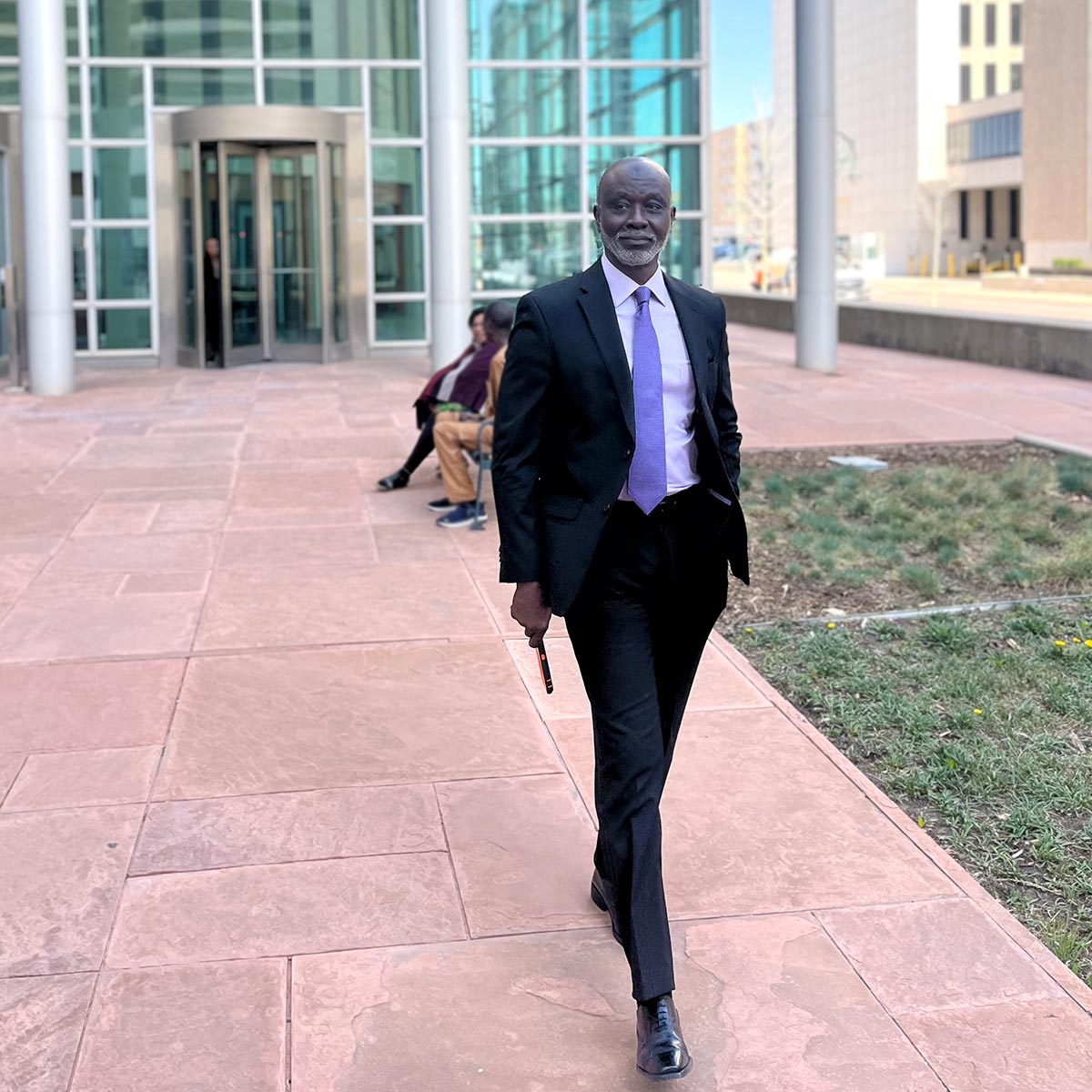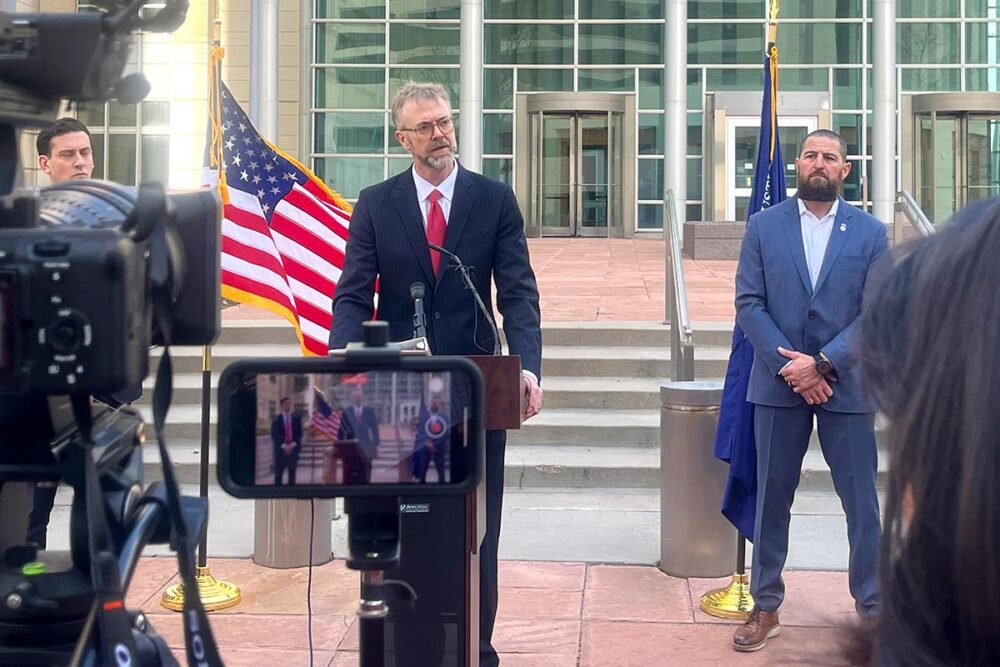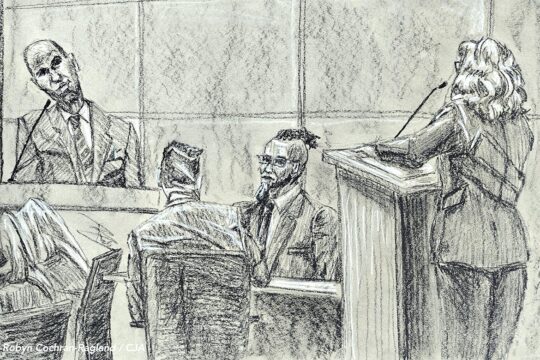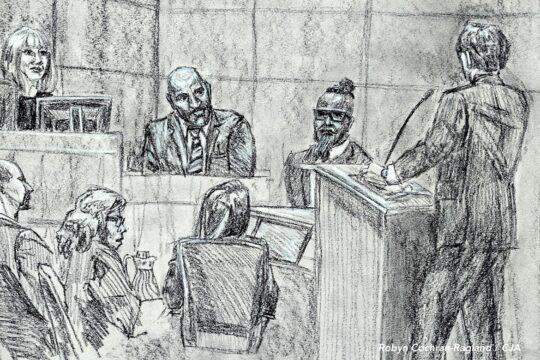Gambian national Michael Sang Correa, former member of the Junglers – a hit-squad under ex-president Yahya Jammeh – listened in silence as his verdict was read out on Tuesday April 15, 2025, before the United States District Court in Denver, Colorado. Correa was facing charges for torture and conspiracy to commit torture on at least five compatriots – Tamsir Jasseh, Pharing Sanyang, Demba Dem, Pierre Mendy (now late) and Yahya Darboe. Correa had pleaded not-guilty to all charges, and his defence argued that he was coerced and under duress.
“Michael Sang Correa made a huge mistake in coming to Colorado. He thought that he could escape accountability for the vile acts of torture that he committed in The Gambia, working as a member of a military organization known as the Junglers to force confessions of treason from enemies of then-President Jammeh. He thought that his crimes against his fellow Gambians would be forgotten. But Colorado is not a safe haven for torturers, it is not a refuge for sadists. And it is not a home for those who flee justice,” J. Bishop Grewell, acting US attorney for the District of Colorado, said at a press briefing after the verdict.
“This is Michael’s day”
In an emotional moment, most victims of Correa who came to testify and were present in the US court were teary as the verdict was announced.
“For years, survivors of Yahya Jammeh’s brutal regime have fought to be seen, to be heard, and to have their suffering acknowledged. Today’s verdict is not just a legal win, it is a powerful affirmation of truth. Today’s verdict is a bittersweet moment, but the long road to justice has finally caught up with Michael Correa,” Isatou Jammeh, a victim of enforced disappearance and member of Gambian civil society who travelled to Denver to observe the trial, told Justice Info.
"Jammeh and his people are getting exposed one by one. What has happened today in America has been witnessed by everyone. This a victory for all victims. When I saw him in court today, I was very emotional, but I thank God. Anyone involved in these crimes should be prepared. This is Michael’s day. It’s going to be their turn one by one,” said Ya Mamie Ceesay, mother of Alhagie Mamut Ceesay who came to Banjul in 2006 from the US for business and disappeared into the Junglers’ hands.
“Gambians had choices”
“You heard many of the choices Gambians made under the Jammeh regime. They explained to you that they had free will and were guided by their conscience. The defendant had the same choices. He went home every night but never left [Gambia],” US Prosecutor Melissa Hindman said in her closing arguments on Monday, April 14.
She acknowledged that there was general fear in The Gambia during Jammeh’s regime. But to her, that cannot be used as an excuse. “Duress is different,” she said. At the end of the day, she added, it is about why the defendant did what he did. “Was there any impending threat or did he relish the power?” Each time Correa did what he did over weeks, Hindman told the court, “there was no such threat.”
“He put a bag over their head, and they were beaten by other Junglers. He is responsible for those acts.” Hindman further noted that the evidence showed that Correa enjoyed the power he had over some officers like Yahya Darboe and Pharing Sanyang. “That is not how you act when you are doing only what you were supposed to do.”
“The defendant knew what it meant to be a Jungler. He had other options. He could have left like other Junglers did, but he chose to stay,”
“Comply or die”
Defence attorney Matthew Belcher, delivering his final statement on Monday, April 14, stated on the contrary that all the witnesses stressed the climate of fear in The Gambia, and how nobody was safe from Jammeh even if you fled the country.
He elaborated on Sainey Bayo’s testimony, telling the court “he [Bayo] has told you that you had to be cautious around President Jammeh. Why? Because he said you could die quickly. Pharing Sanyang said he saw him [Jammeh] walk at the NIA to make sure his orders were followed. Tamsir Jasseh told us he [Jammeh] was on the phone.” He added that other witnesses like Alieu Jobe testified that he did not flee the country because he was scared that Jammeh would wipe his family out.
Darboe, Bayo, and Sanyang (now retired from the army) were all members of the military. Alieu Jobe was the former accountant general whom Ndure Cham, a Chief of Defence Staff who spearheaded the 2006 coup against Jammeh, had recommended to lead the civilian government if the coup succeeded. Jasseh was the then director of immigration. When the coup failed, they were arrested, tortured by Junglers and forced to confess to being part of the plot. Except for Bayo, they were all prosecuted and sent to Mile 2 Prison.
“Michael Correa had to follow President Jammeh’s orders without question,” Belcher continued. “It mattered not, ladies and gentlemen, in 2006 what your status was. When President Jammeh suspected you, he let hell rain on you. This was not hypothetical. It was real. The government [prosecutor] wants to sit here in the United States in this place of privilege and say ‘I could have just left.’"
He further argued that the US government attorney did not present any evidence that showed Correa had the financial means to leave The Gambia. “There was an imminent, real, violent threat. Correa could not refuse and escape the threat. He had one option: comply or die.”

“He was not threatened”
“You heard there were testimonies that there was a general fear and the Junglers were not immune to that. What the testimonies don’t say is that the defendant was under duress when he was torturing these individuals. That rests in your [defence’s] hands,” retorted prosecutor Hindman.
“What you have not heard is what this defendant was told would happen to him if he had not done it. He was never threatened,” she said, adding that if this threat were sufficient, then no Jungler will ever be held accountable. “There is no evidence of the defendant’s family ever being threatened. The only time you heard about the defendant’s family is that he went to his ex-wife every night,” she added.
Admitting to torture after denial
On Monday, the prosecution continued questioning retired special agent Barton Garrison and continued playing the audio recording of Correa’s hearing at the US immigration court. During that testimony, Correa said that the first order he received after the March 2006 failed coup was to arrest Lieutenant Colonel Vincent Jatta, now late, who was Chief of Defence Staff. He told the court that he and other Junglers went to Jatta’s home and arrested him and took him to the National Intelligence Agency (NIA).
The second order, he said at the immigration court, was to torture Pierre Mendy. Lieutenant Colonel Pierre Mendy was the commander at Fajara Barracks. He was among a group of soldiers arrested, tortured to confess to their participation in the coup and later imprisoned. He died in August 2021 before he could have the chance to narrate his story in this court. According to Correa, he was home when Nuha Badjie called and asked him to get dressed and come to the NIA because they had orders. Correa said he asked Badjie what they were doing there, that Badjie told him some of the officers were not cooperating with the investigations and they were there to get a confession out of them.
According to Correa, he had protested this order, stating that was not his job and not in line with his beliefs as a Christian. “Are you challenging the President’s orders?” Correa recalled Badjie questioning him. During that back and forth, Correa added, Tumbul Tamba who was leading this operation asked “Michael, you said what?”
“Michael, do as you are told. It is an order.” This is what Correa said his late victim, Mendy, advised him. “He was kneeled, and I asked him to bend over, which he did. That’s when I started lashing him. That’s when he said yes, I know about the coup, and then I stopped.” The defendant could be heard crying in the audio as he narrated the torture of Mendy.
“I had no choice. I was a private soldier. I hit him a couple of times and Pierre started talking.” Correa also admitted that his supervisors were present when he was torturing Mendy.
A short trial
Correa’s trial was initially scheduled to start in September 2024, but it was postponed after the defence filed a motion to travel to Gambia to collect depositions from former deputy director of the NIA Momodou Hydara and former Jungler Alieu Jeng.
But when the prosecution closed their case on Monday April 14, the defence rested their case without calling any witness to the stand, including the ones they had said were travelling to Denver.
The trial was expected to last for two weeks and the verdict to be rendered at least a week later. The Denver Court announced, on Tuesday April 15, that Correa has been found guilty of all charges and that the sentencing will be done “at a later date”.






